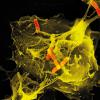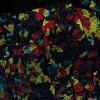Researchers from Tokyo Medical and Dental University (TMDU) have identified an autoantibody – a protein that is produced by the immune system to attach to a specific substance from the individual’s own body, rather than to a foreign substance, such as a virus or bacteria – in some patients with schizophrenia.

Notably, they also found that this autoantibody caused schizophrenia-like behaviours and changes in the brain when they injected it into mice.
When considering possible autoantibodies that might cause schizophrenia, the research team had a specific protein in mind.
Previous research has suggested that neural cell adhesion molecule (NCAM1), which helps cells in the brain talk to one another via specialised connections known as synapses, may have a role in the development of schizophrenia.
Lead author of the study, Hiroki Shiwaku, said: “We decided to look for autoantibodies against NCAM1 in around 200 healthy controls and 200 patients with schizophrenia.
“We only found these autoantibodies in 12 patients, suggesting that they may be associated with the disorder in just a small subset of schizophrenia cases.”
Image credit | Shutterstock




